
FEBRUARY/MARCH 2006
By Gideon Levy
The children threw stones, the border policemen
threw grenades.The result: an 8-year-old boy in 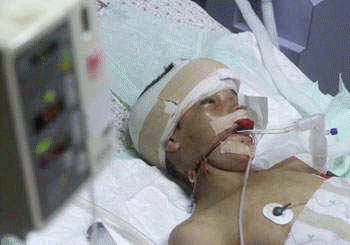 intensive care with a serious head injury,
anesthetized and on a respirator, his situation serious
but stable Abud moves his right leg for a moment. His
left side is paralyzed. The respirator tube is stuck in
his mouth, his little chest rises and falls at the rate
dictated by the machine, his eyes are swollen and closed.
A little boy in a coma. Will the border policemen who
chased him in the alleys of the refugee camp, tossing
stun grenades at little children, see him? Will they
think about his fate - to die or to remain a cripple for
the rest of his life?
intensive care with a serious head injury,
anesthetized and on a respirator, his situation serious
but stable Abud moves his right leg for a moment. His
left side is paralyzed. The respirator tube is stuck in
his mouth, his little chest rises and falls at the rate
dictated by the machine, his eyes are swollen and closed.
A little boy in a coma. Will the border policemen who
chased him in the alleys of the refugee camp, tossing
stun grenades at little children, see him? Will they
think about his fate - to die or to remain a cripple for
the rest of his life?
His head is bandaged, hiding the compressed fractures in
his skull. The doctors will be able to assess the amount
of brain damage only in a few days. This Sunday, two days
after he was wounded, there was a slight improvement. A
very slight one, says the doctor cautiously. But the
child is not waking up. High up in the adjacent building
lies an old man in a similar state: Ariel Sharon. But
Abdel Malek Zalbani is only 8 years old, a third-grade
pupil, a child of refugees. His pet name: Abud.
The Border Police come to the camp almost every day. The
residents of the camp say that they provoke the children,
they honk and they curse. The children throw stones at
them. The border policemen throw grenades at the
children, stun and smoke grenades. The thunder makes the
walls of the houses tremble, the gas penetrates the
crowded homes, suffocating their inhabitants, including
many old and sick people, and many children. The
residents place plastic sheets on their windows, but it
doesn't help.
That has been the situation for several months, since the
construction work on the "Jerusalem envelope"
wall began, in the valley at the end of this crowded
refugee camp, Shoafat. There are 40,000 residents on two
square kilometers, refugees from the Jewish Quarter of
the Old City in 1967, Jerusalemites with blue ID cards
like mine and yours.
Sometimes it ends with temporary suffocation, sometimes
it ends with brain damage, as in the case of the child
Abud. It didn't happen during the evacuation of Amona,
nor in the caravillas of Carmia, and therefore hardly
anyone writes about it. The Justice Ministry's Police
Investigation Unit is investigating: This week,
investigator Shai phoned the central eyewitness, and
after a few moments he cut off the conversation
impatiently, after the witness asked the investigator to
come to the scene of the incident. Investigator Shai
refused to come, and said that he would call again 10
minutes later. Shai did not call back.
The investigation was apparently finished. The eyewitness
says that he saw Abud hurt by a stun grenade that hit his
head. The Border Police claim that the child was hit by a
stone thrown by one of his friends. Border Police
spokeswoman Superintendent Sarit Philipson didn't even
bother to reply to Haaretz. In the Shoafat camp, they are
threatening to turn the camp into "Vietnam." At
Hadassah University Hospital in Ein Karem, the doctors
are fighting for Abud's life.
The site of the incident: a junction of steep, narrow
alleys that descend to the wadi and the wall that is
gradually being built in the middle of it. Every house
leads straight to the street where piles of garbage are
strewn, including the remains of the Border Police
grenades. Here is the house into which Abud was brought
when he fled from the pursuing border policemen. The
owner of the house, Ibrahim Amla, awoke to the smell of
gas spreading in his house.
Outside the children were running around, and Amla's
sister rushed to bring Abud into their house. But the
child immediately sneaked outside. Amla came out after
him, and then he heard a loud noise, and immediately saw
Abud fall on his face, his back to the border policemen
and a great deal of blood flowing from his nose and his
mouth. Amla is convinced that the stun grenade is what
hit Abud. "The noise of the grenade came exactly
when he fell."
He identified the commander of the force who was standing
behind the corner, a man named Yigal Larouche. Amla says
that even after the boy fell, the border policemen did
not approach him to administer first aid. Amla picked up
the boy and brought him to his neighbor Ahmed Jamil, who
was less out of breath than he was, and Jamil ran with
the boy to the nearby clinic. The boy's father saw all
that in his car mirror, while he was parking, on his way
home. The father works as a maintenance man at Shaarei
Zedek Medical Center in Jerusalem.
When the border policeman pass through the valley with
their jeeps, the children throw stones at them. Afterward
the Border Police run after them into the alleys, and
throw their stun and gas grenades at them. "Means
for dispersing demonstrations" that nobody dreamed
of using in Amona, which is now demanding a commission of
inquiry.
Last Friday, shortly after 11 A.M., Ibrahim Zalbani, the
boy's father, was returning home from his work at Shaarei
Zedek and was about to park his car. He already smelled
the gas at the entrance to the alleys. When he parked, he
heard a boom, and immediately afterward the screams of a
woman. Then he saw his neighbor in his mirror, fearfully
carrying a bleeding child in his arms. By the time he had
emerged from his car, they had already told him that it
was his Abud. "I was in shock. Anyone who saw him
was sure he was finished. His head was crushed. I didn?t
know what to do."
At the nearby HMO branch, they tried to call an
ambulance, but an Israeli ambulance won't enter the camp
without an escort. Ismail and his horrified brothers
rushed to take Abud to Hadassah University Hospital at
Mt. Scopus, in their car. They were not sure that he
would make it to the hospital alive. At Mt. Scopus they
called an ambulance to rush Abud to Hadassah Ein Karem,
where they quickly brought the child into the operating
room. They told the father that Abud's life was in
danger.
The camp residents have been very upset since the
construction of the wall began. There isn't a day without
stones, and not a day without gas. Aside from Shabbat.
This Sunday, too, the camp was silent, and the border
policemen disappeared, apparently because of the
incidents on Friday. "They overdo it too much
here," says the shutter man, Wahal Mohammed Ali,
whose house in the camp was demolished a few years ago,
along with another two dozen homes. "Why? Because I
approached Pisgat Ze'ev. It wasn't Pisgat Ze'ev that
approached me. I've been here since 1967, and they came
in 1995."
"You're a settler," says Amla to him defiantly.
"No, I'm a terrorist," replies the shutter man,
from his red van. "They don't want us here. We
disturb the view of Pisgat Ze'ev. They look from the
balconies and see a refugee camp. That disturbs their
view."
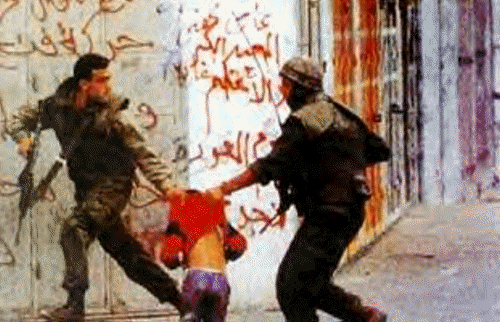
Everyone here speaks good Hebrew, and most of them work
in Jerusalem. Amla: "I want the world to know that
if the situation continues this way, there will be a
Vietnam here. If necessary we will open Vietnamese-type
traps. We'll do whatever we have to here, because we have
nothing to lose. There is nothing more precious to us
than our children and our elderly parents."
Shai of the PID is on the phone. He wants Amla to come to
give testimony. Amla: "Send the investigators here,
to see the scene of the incident. This incident did not
come from nowhere. It came after an accumulation of many
incidents. I'm not talking to you about politics. I'm
talking to you about the behavior of your soldiers. I'll
give testimony here. Do you want me to tell you what
happened, or do you want me to tell you what you want to
hear?"
"I'll call in another 10 minutes, and you decide if
you want to come to give testimony," says Shai,
hanging up forever, apparently. The PID is investigating.
Amla was married to a Jewish woman, a new immigrant from
Argentina, who has been in Eilat since their divorce.
Their four children are with him in the camp. They called
one of their daughters Millennia, because she was born on
the day when the millennium was supposed to begin
according to the count of Nostradamus, as Amla explains
to us. They called their other daughter Miari, after the
hero of the book by Guatemalan author Miguel Angel
Asturias, as Amla also explains.
He is an electrician who worked for six years for fat
Itzik at Cafe Olga in North Tel Aviv, from where he
remembers Judy Nir-Mozes Shalom, and afterward he worked
as an installer of satellite dishes and converters for
the YES satellite company. When he speaks about the
poverty of his camp, he quotes from the film "The
Silence of the Lambs," which said that people have a
desire, as he puts it, for what they see around them.
"Do you know what it is to come back from an
installation at Kibbutz Harel to this camp?" His
sister lives in Calabria, Catalonia, north of Barcelona,
where she married a local resident who converted to
Islam.
"I'm a proud Palestinian, and I know that I'm your
enemy. I know that this war will not end, and I know that
your attitude toward my existence is like your attitude
toward the existence of an insect, even though I have a
blue ID card like yours. I heard that during the
evacuation of Gaza they taught the soldiers how to show
restraint and how to behave nicely. Here they train them
in mercenary camps. They don't care who gets hurt. You're
building a wall. I don't think that it justifies such a
large amount of gas. For every child who throws a stone,
you punish 100 families. How far can a child get with a
stone? If a child in Pisgat Ze'ev were to throw a stone,
would you also use gas against Pisgat Ze'ev?
"I once had an argument with a border policeman. He
told me: Keep an eye on the children so they don't throw
stones. I told him: I'm not your bodyguard. I didn't
invite you here, and I'm not responsible for your safety
here. You, on the other hand, are my guest, and I'll kill
in order to protect you, but the soldiers are not my
guests. We try to prevent the children from throwing
stones, but when I saw that even after I disperse the
children, sometimes by force, and I ask the Border Police
to stop throwing grenades and they continue, I stopped
trying to disperse them. The Border Police toss grenades
in every situation. They're suffocating us.
"I've been here since I was born. All my life we
used to go to the forest opposite. That's the only place
where the children can go. Pisgat Ze'ev is there, and now
they're building the wall, too. Where will we go? Where
will the children go? There isn't a single playground
here in the entire camp. Let them take the blue ID cards.
We have no problem with that. If a soldier wants to abuse
me, he can do so even with a blue ID card."
Amla says that some of the children of the camp walk
around with birth certificates in their pockets. There is
probably no other place in the universe where children
walk around with their birth certificates. The soldiers
ask for their ID cards, and if they don't have them, they
sometimes have to show their birth certificates. There is
a roadblock at the camp, and going out in the morning to
the schools outside the camp, where almost all the
residents have Israeli ID cards, is sometimes difficult.
Ibrahim Zalbani sits downcast at the entrance of the
children's Intensive Care unit at Hadassah Ein Karem.
Occasionally he goes in to his son, covers his pale body,
and leaves looking even sadder. He is 32 years old, with
five children, and Abud is the "sandwich," as
he puts it. He praises the care given to Abud in
Hadassah, and the attitude toward him, and complains
about the rudeness of one of the emergency room nurses at
Hadassah Mt. Scopus. Abud's grandparents sit with him,
his mother goes back and forth between the children who
remain at home in the refugee camp, and the hospital.
The attending doctor, Dr. Jack Brown: "The child
arrived with a serious head injury, which we diagnosed
according to external signs and a CAT scan. He underwent
a head operation, and since then he has been anesthetized
and on a respirator. He is still anesthetized and on a
respirator, and there are signs of a gradual improvement.
We are two days after the injury, and we have to wait a
few more days in order to know his condition. He has a
brain injury. We can assume that he will be handicapped,
but it is still hard to know to what extent. In medical
terms, the situation is serious and stable."
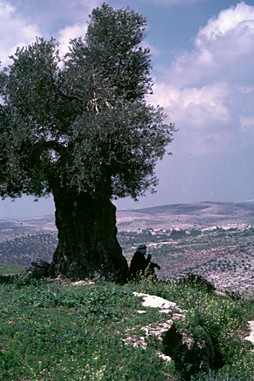
The
story of the trees
reported
by Adam Keller
The idea was: as Olive Harvest Coalition to do something about the Palestinian loss of olive trees - replanting saplings for all the trees uprooted on behalf of the notorious wall, and for the trees destroyed overnight by malicious settlers. With money raised in an international campaign, and with hundreds of old and young activists from all over the country taking part thousands of trees were planted on this Saturday alone. Activists from Tel-Aviv and Haifa went to Kaffin; the Jerusalemites with an addition from Be'er Sheva to the South Hebron Hills.
Kaffin
A desolate landscape. Behind us the last houses of the Israeli Arab town of Bak'a al Garbiya, a single old border stone still marking the pre-'67 "Green Line". Ahead, the "Separation Fence", with its grim lines of barbed razor wire mounted with electronic "early warning devices" and interspersed with military patrol roads. We have arrived at the cut off Kaffin lands, already four year virtually inaccessible to their owners, once full with trees - now strewn with high mounds of rubble and smelly rubbish.
"This garbage dump is completely illegal. Some individuals or companies took advantage of the lands being unattended. They just started to dump here, it is more cheap than the legal places" says Wai'a Gazawi, an Arab Israeli activist from the nearby town of Kalamsawa. He is a district coordinator for Al-Ahale, a newly-founded association based in Nazareth (*) taking upon itself the care of lands from which the Palestinian ownwers have been excluded.
"We formally notified the Ministry of the Environment, which is legally bound to act in such cases. and asked them to remove all this, but we are not holding our breath waiting for them to act. We raised enough funds from donations to remove all the garbage ourselves. In a month from now there will be no garbage left and the olive saplings which are planted today will have all the room they need to grow and develop".
These explanations were actually filling the time of a delay. The army, it turned out, reneged on an earlier agreement and blocked the delegation of Kaffin villagers from crossing the fence and coming to us. The rusty condition of the lock on the gate in the fence testified to how rarely it is opened. "This gate is installed for the Supreme Court. They tell the judges that there are gates for the villagers' use - but how often the gates are opened, and whether the villagers are let through, is quite another thing" says an experienced activist.
While organizers start negotiating with officers, activists take the time to finish preparing two giant banners, proclaiming in Hebrew and Arabic "They uproot - we will plant!". Others just wander around, discovering that the Al-Ahali tractor has already dug holes in the earth, ready for the saplings.
Finally, the officers allow through the Fence ten Kaffin arbitrarily selected villagers (out of some twenty-five who had intended to come to meet us), led by the town's mayor. They also let through the van carrying the olive saplings.
The work is actually quite simple: take off the black nylon covering around the roots, carefully place the sapling in the hole, and fill in. Some activists use mattocks and spades - which makes them look like the early Zionist pioneers in the old black-and-white photos. But in fact, it is easy enough, even with bare hands.
"Welcome, friends, to the land of Kaffin, and thank you for coming to help us" says Mayor Taysir Harashi, as we assemble at the end of the work at a more or less level piece of land. "You should know that this is the first time that I am able to visit this part of our lands since the Fence went up four years ago. Until 2001 Kaffin had some 10,000 dunums [four dunums = one acre]. 6,000 were left behind the fence, we have 4,000 left -2,000 are built up, 2,000 are all that we have left to live from.
The army is very tight-fisted with the permits. Many people who ask are refused, without giving any reason. If you get a permit at all, it is only for the harvest season. There are almost no permits for the rest of the year, to do the necessary maintenance. We told the army that if they don't let us remove the undegrowth between the olive trees, fires could spread very quickly. They did not listen.
Then the fire really came - five fires, burning our olive trees, in three months. Every time it was the same. We asked the army for a permit for the Palestinian fire brigade to cross and put off the fire, and the army did not allow it. Our Israeli friends in Kibbutz Metzer tried to call the Israeli fire brigade, but they did not come in time. We could just watch across the Fence and see our trees burning. 4,500 dunums out of the 6,000 on this side were totally burned. We asked the army to investigate what caused the fire, they shrugged and said it was probably an accident. Somebody dropping a cigarette, something like that, or pehaps five people dropping five cigarettes. Who knows?"
"We have a very long history of contacts with Kaffin, as with the other Arab towns and villages around here" says Doron Lieber, General Manager of the nearby Kibbutz Metzer. "Actually, the government people who placed us in this area, back in 1953, intended us to act as a kind of buffer, to separate the Arab villages from each other, but they chose the wrong people for the job. We always felt we want to be a bridge, not a buffer or barrier.
In the 1950's Kaffin, like the rest of the West Bank, was under Jordanian rule. But there was no border fence then, and it was not too difficult to establish friendly relations. This continued after 1967, and we never had any problems of theft or burned fields, which plague many other border communities. When the Fence started to go up, we pleaded with the army people to put it along the Green Line route and not touch the land of Kaffin, we told them that hungry and frustrated neighbors are the worst danger to security. We said that we prefer to give up some of our own land. We thought that perhaps we convinced them, but then came the attack on us. [A Palestinian infiltrator killed a woman and two children at Metzer].
Of course our friends at Kaffin offered condolences, mourned our dead as their own. But the army used it as the final pretext to push the Fence route deep into the land of Kaffin, as they intended all along. Stupid folly!
Now, we try to act as the wards of the land, until the Kaffin people could take care of it themselves once again. Together with Al-Ahali we have undertaken to tend the saplings which will be planted today, to trim the trees and get rid of the undegrowth, to build acess roads. But I hope we will have to be the caretakers only for a short while".
"Metzer and Kaffin should serve as the pattern for the peoples and communities of this country. We will struggle together until we pull down the Walls and Fences, we will not let them separate us. There can be no peace without justice!" burst out Jana Zifferblatt, of the Women's Peace Coalition. And Suhel Salman, of the Tulkarm branch of PARC (Pal. Agricultural Relief Committees) was equally eloquent: "Our slogan is 'They uproot - we plant', and it is more than a slogan. Peace is impossible with Separation Fences which are hatred fences. Life is too short to be wasted in contests of hatred. We are not only planting olive saplings, we plant seeds of love".
Uri Avnery of Gush Shalom paints a grim perspective: "As we said from the first moment, this is not a security fence. It is an annexation fence, which intends to cut off outright some 10% of the West Bank. And then there is the Jordan Valley which is another 33%. Sharon always said he wanted it, and now Sharon is in coma but Olmert continues on his way, there are roadblocks completely forbidding West Bank Palestinians from going there. And then there is "Greater Jerusalem" and the "settlement blocks" and "the access roads" - and altogether, Israel keeps more than half of the West Bank, the Palestinians are suffocating in isolated enclaves, and the hidden hope of those who plan it is that they will just go away by themselves.
And now, they have the perfect pretext - Hamas, the Palestinian Palestinian Parliament where Hamas is the majority and which is being inaugurated at this very moment in Ramallah. Our politicians say they will never talk to Hamas. We have an electoral contest in Israel, a contest between three main parties who compete at who is best at not talking to the Hamas. As if they talked with Abu Mazen, when for a whole year he was offering and asking and pleading with them to talk with him. They did not! They didn't want Arafat, they didn't want Abu Mazen, now they have got Hamas - and now they have to talk to Hamas! You can only make peace with your enemy, and only your enemy can decide who will represent them. That was true for Arafat and the PLO twenty years ago, it is true for Hamas now."
The concluding remarks come from Ya'akov Manor, coordinator of the Olive Harvest Coalition who had initiated this entire event. "I have news from the South Hebron Hills. Our friends from Jerusalem have planted succesfully trees at four different locations, near settlements and "outposts" where olive trees were uprooted by settlers. The saplings planted, both here and there, were paid for by donations. I should especially remark on the donations of Jewish activists in the Boston Area. (**)
So much for the good news. But I am sorry to say that the last part of our program - sitting down and having some informal talk with our Palestinian friends while eating good pita bread with humus - must be cancelled. The army gave them permission to be here only until 2.00 PM, which is a quarter of an hour from now. After that, the gate will be closed to them and their presence here, in their own land, will be considered illegal. So it must be goodbye, right now".
photos expected soon at the Gush Shalom site
contact:
Taisir Harashi, Mayor of Kaffin - <Taisir_Harashi@yahoo.com>
Doron Lieber, Kibbutz Metzer <merakez_meshek@metzer.org.il>
Wadi'a Gazawi, Al Ahali Association <wadgaz16@hotmail.com>
(*) Al-Ahale website
nif.org/content.cfm?id=1648&currBody=1
(**) Some
of the American donors wrote moving dedications
you can read them at:
geocities.com/toi_billboard/tree_dedications.htm
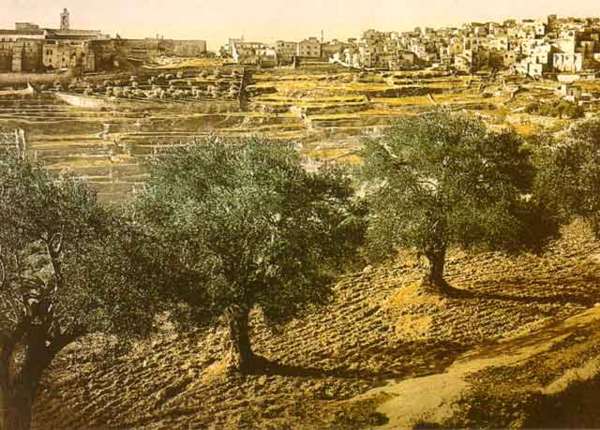
Uri Avnery
18.2.06
A War of Religions? God Forbid!
ONE OF our former Chiefs-of-Staff, the late Rafael ("Raful") Eytan, who was not the brightest, once asked a foreign guest: "Are you Jewish or Christian?"
"I am an atheist!" the man replied.
"Okay, Okay," Raful demanded impatiently, "but a Jewish atheist or a Christian atheist?"
Well, I myself am a 100% atheist. And I am increasingly worried that the Israeli-Palestinian struggle, which dominates our entire life, is assuming a more and more religious character.
THE HISTORICAL CONFLICT began as a clash between
two national movements, which used religious motifs only
as a decoration.
The Zionist movement was non-religious from the start, if not anti-religious. Almost all the Founding Fathers were self-declared atheists. In his book "Der Judenstaat", the original charter of Zionism, Theodor Herzl said that "we shall know how to keep (our clergymen) in their temples." Chaim Weitzman was an agnostic scientist. Vladimir Jabotinsky wanted his body to be cremated - a sin in Judaism. David Ben-Gurion refused to cover his head even at funerals.
All the great rabbis of the day, both Hassidim and their opponents, the Missnagdim, condemned Herzl and cursed him ferociously. They rejected the basic thesis of Zionism, that the Jews are a "nation" in the European sense, instead regarding the Jews as a holy people held together by observance of the divine commandments.
Moreover, in the eyes of the rabbis, the Zionist idea itself was a cardinal sin. The Almighty decreed the exile of the Jews as punishment for their sins. Therefore, only the Almighty Himself may revoke the punishment and send the Messiah, who will lead the Jews back to the holy land. Until then, it is strictly prohibited to "return en masse". By organizing mass immigration to the country, the Zionists rebel against God and, worst of all, hold up the coming of the Messiah. Some Hassidim, like the Satmar sect in America, and a small but principled group in Israel, the Neturei Karta (Guardians of the City) in Jerusalem, still adhere to this belief.
True, the Zionists expropriated the symbols of Judaism (the Star of David, the candlestick of the Temple, the prayer shawl that was turned into a flag, even the name "Zion") but that was only utilitarian manipulation. The small religious faction that joined Zionism (the "Religious Zionists") was a marginal group.
Before the Holocaust, we learned in the Zionist schools in Palestine to treat with pitiless scorn everything that was "exile Jewish" - the Jewish religion, the Jewish Stetl, the Jewish social structure (the "inverted pyramid"). Only the Holocaust changed the attitude towards the Jewish past in the diaspora, referred to in Hebrew as "Exile".)
Ben-Gurion made some concessions to the religious factions, including the anti-Zionist Orthodox. He released some hundreds of Yeshiva-students from military service and set up a separate "state-religious" school system. His aim was to acquire convenient coalition partners. But these steps were based on the assumption (common to all of us at the time) that the Jewish religion would evaporate anyhow under the burning Israeli sun and disappear altogether in one or two generations.
All this changed in the wake of the Six-day War. The Jewish religion staged an astounding comeback.
ON THE Palestinian side, something similar happened, but
against a quite different background.
The Arab national movement, too, was born under the influence of the European national idea. Its spiritual fathers called for the liberation of the Arab nation from the shackles of Ottoman rule, and later from the yoke of European colonialism. Many of its founders were Arab Christians.
When a distinct Palestinian national movement came into being, following the Balfour Declaration and the setting up of the British Government of Palestine, it had no religious character. In order to fight it, the British appointed a religious personality to the leadership of the Palestinian community in Palestine: Hajj Amin al-Husseini, the Grand Mufti of Jerusalem, who quickly assumed the leadership of the Palestinian struggle against the Zionist immigration. He endeavored to give a religious face to the Palestinian-Arab rebellion. Accusing the Zionist of designs on the Temple Mount with its holy Islamic shrines, he tried to mobilize the Muslim peoples in support of the Palestinians.
The Mufti failed miserably, and his failure played a part in the catastrophe of his people. The Palestinians have all but obliterated him from their history. In the 1950s, they idolized Gamal Abd-al-Nasser, the standard-bearer of secular, pan-Arab nationalism. Later, when Yasser Arafat founded the modern Palestinian national movement, he did not distinguish between Muslims and Christians. Right up to his death, he insisted on calling for the liberation of the "mosques and churches" of Jerusalem.
At one stage of its development, the PLO called for the creation of a "Democratic secular state, where Muslims, Jews and Christians will live together". (Arafat did not like the term "secular", preferring "la-maliah", meaning "non-sectarian".)
George Habash, the leader of the "Arab Nationalists" and later of the "Popular Front for the Liberation of Palestine", is a Christian.
This situation changed with the outbreak of the first intifada, at the end of 1987. Only then did the Islamist movements, Hamas and Islamic Jihad, start to take over the national struggle.
THE ASTOUNDING victory of the Israeli army in the Six-day
war, which looked like a miracle, effected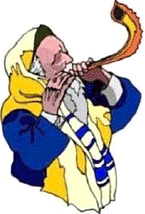 a profound political and cultural change in
Israel. When the shofar sounded at the Western Wall, the
religious youth, which had until then been vegetating on
the fringe, occupied the center of the stage.
a profound political and cultural change in
Israel. When the shofar sounded at the Western Wall, the
religious youth, which had until then been vegetating on
the fringe, occupied the center of the stage.
Suddenly it was discovered that the religious education system, which had been set up by Ben-Gurion as a political bribe and contrary to his own convictions, had been quietly turning out a fanatical religious product. The religious youth movement, which had suffered all these years from feelings of humiliation and inferiority, was filled with zeal and started the settlement drive, leading the main national effort: the annexation of the occupied territories.
The Jewish religion itself underwent a mutation. This mutant shed all universal values and became a narrow, militant, xenophobic tribal creed, aiming at conquest and ethnic cleansing. The religious-Zionists of the new sort are convinced that they are fulfilling the will of God and preparing the ground for the coming of the Messiah. The "national-religious" cabinet ministers, that had always belonged to the moderate wing of the government, gave way to a new, extremist leadership with tendencies towards religious fascism.
Israel has not become a religious state. It still has a large secular majority. According to the authoritative Israeli Government Bureau of Statistics, only 8% of Israeli Jews define themselves as "Orthodox" (Haredim), 9% as "religious" (meaning Religious Zionists), 45% as "secular, non-religious" and 27% as "secular, traditional".
However, because of their role in the settlement enterprise, the "religious" have acquired a huge influence over the political process. They have practically prevented any move towards peace with the Palestinians. They have also provoked a religious reaction on the other side.
THE PALESTINIAN resistance to the occupation, which
reached a peak with the outbreak of the first intifada in
1987, has given a big push to the religious forces. Until
then, these had been growing quietly (not without the
encouragement of the occupation authorities, which saw in
them a counterweight to the secular PLO.)
The first intifada led to the Oslo agreement and brought Yasser Arafat back to Palestine. But the new Palestinian authority failed in its aim of putting an end to the occupation and establishing a secular Palestinian state. With settlements continually expanding all over the West Bank and the Gaza Strip, the Palestinian public increasingly tended to support armed resistance. In this struggle, and with the limited means available, the religious factions excelled. A religious person is more ready to sacrifice his life in a suicide attack than his secular cousin.
The anger of the Palestinian public over the corruption that has infected sections of the secular Fatah leadership (but not the ascetic Yasser Arafat, whose reputation remained clean) has increased even more the popularity of the religious, whose honesty is unquestioned.
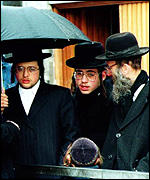 FOR YEARS I have been haunted by a
nightmare: that the Israeli-Palestinian conflict would
change from a national to a religious confrontation.
FOR YEARS I have been haunted by a
nightmare: that the Israeli-Palestinian conflict would
change from a national to a religious confrontation.
A national conflict, terrible as it may be, is soluble. The last two centuries have seen many national wars, and almost all of them ended in a territorial compromise. Such conflicts are basically logical, and can be terminated in a rational way.
Not so religious conflicts. When all sides are bound by divine commandments, the attainment of a compromise becomes far more difficult.
Religious Jews believe that God promised them all of the holy land. Thus, giving away any of it to "foreigners" is an unforgivable sin. In the eyes of Muslim believers, the whole country is a Waqf (religious trust), and it is therefore absolutely forbidden to surrender any part of it to unbelievers. (When the Caliph Omar conquered Palestine some 1400 years ago, he declared it a Waqf. His motive was quite practical: to prevent his generals from dividing the land between themselves, as was their wont.)
By the way, the evangelical fundamentalists who dominate Washington at this time also see the Holy Land as a religious property, to which the Jews must return in order to make possible the second coming of Jesus Christ.
Is a compromise between these forces possible? Certainly yes, but it is much more difficult. A devout Muslim is allowed to declare a Hudna (armistice) for a hundred years and more, without condemning his soul to hell. Ariel Sharon, who began the evacuation of settlers, spoke about "long-range temporary arrangements". In politics, "temporary" measures have a tendency to become permanent.
But wisdom, sophistication and a lot of patience are needed to reach a resolution of the conflict in these circumstances.
On the day Arafat died, many Israelis were angry with me for saying (in a Haaretz interview) that we shall yet long for this secular leader, who was both willing and able to make peace with us. I said that his elimination removes the last obstacle to the rise of Islamic fundamentalism in Palestine and the entire Arab world.
One did not need to be a prophet to
see that.